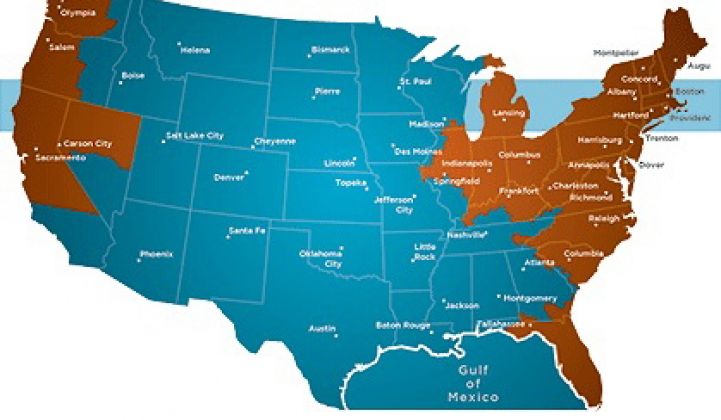Arcadian Networks, the startup that raised $90 million for a utility smart grid business built on access to a private 700-megahertz wireless spectrum, appears to be out of business. After all, it’s pretty hard to build a business on spectrum that you don’t have any control over.
But that appears to be the case for Valhalla, N.Y.-based Arcadian, which according to public records no longer holds any licenses with the Federal Communications Commission for the spectrum it once sold as the most secure and reliable way to link smart grid devices.
Add the facts that the company hasn’t issued a press release in 18 months, that its listed phone numbers no longer accept voicemails, that emails sent to company executives are bouncing back as undeliverable, and that the company’s general counsel is declining to discuss the company’s status with reporters, and Arcadian appears to be a pretty clear case of a company that’s no longer a going concern.
We’re reaching out to company executives and associates for comment, but the facts appear to speak for themselves. What series of events led to Arcadian’s current status, on the other hand, aren’t yet clear.
Arcadian was launched in 2006 by networking, telecom and wireless industry vets and $90 million from Goldman Sachs, Gilo Ventures and Clal Industries. Its premise was that utilities would be willing to pay a company both for the expertise in building a secure, long-range wireless network for smart grid devices, as well as for gaining access to the licensed spectrum to run it on.
A U.S. map on Arcadian’s business cards laid out where the company said it had access to that 700-megahertz spectrum, in a broad swath covering the country’s Rocky Mountain West, Midwest and Southeast.
But, while it’s not clear how much of that territory was covered by spectrum Arcadian had licensed directly versus leased from other license holders, it does appear clear that Arcadian doesn’t hold any spectrum itself as of Dec. 2011.
A quick license search at the FCC’s website yields nine lease identification numbers, all of which show “canceled” or “expired” status. That doesn’t necessarily mean that the company lacks any access to 700-megahertz spectrum, however -- it could have turned over the licenses to its customers, noted Matthew Nodine, chief of staff for the FCC’s Wireless Telecommunications Bureau.
So what’s the status of Arcadian’s customers? Back in 2009, Arcadian said it was involved in five applications for Department of Energy smart grid stimulus grants totaling about $150 million. But its one and only utility client at the time was Minnesota’s Great River Energy, which provides electric service to 28 distribution cooperatives serving about 645,000 members across the state.
Arcadian built the utility a network to link various smart grid devices using a variety of communications -- WiMAX, Wi-Fi, 3G/4G cellular and the 900-megahertz systems that network most of the country’s smart meters -- across 55,000 square miles of territory.
Therese LaCanne, Great River Energy’s communications manager, told me last week that the utility does indeed continue to run that network. In fact, it bought those assets from Arcadian in September 2010, and utility employees now operate the system on their own.
But as for the 700-megahertz spectrum the network uses, LaCanne said that the utility leases that from a company called Access Spectrum -- and that Arcadian never actually held the license for the spectrum itself.
Andrew Rein, director at Access Spectrum, told us that the Bethesda, Md.-based company has held the license for the 700-megahertz spectrum that Great River Energy is using since 2001. Access Spectrum did lease Arcadian the rights to use that spectrum for some period of time, but “those rights have expired,” he said.
While Rein wouldn’t give more details as to how much spectrum it may have leased to Arcadian in other territories, he did make it clear that Arcadian is not a customer anymore, and he said he has no knowledge of its current activities.
Searching through Arcadian’s press release archive yields no clues as to whether the company was able to land any other customers, or whether or not it had opened up alternative lines of business. Back in May 2010, Arcadian announced a new WiMAX gateway device -- and that was the last press release published on the company’s website.
Arcadian had 65 employees as of April 2010, with offices in New York and Minnesota and a Tel Aviv, Israel research center with about 22 employees. Phone calls to the company's listed numbers have gone unanswered, and emails sent to listed company executive addresses have been returned as undeliverable. Great River Energy's LaCanne referred us to Arcadian's general counsel, Daniel Rosemark, who has not returned a phone message left last week seeking comment.



